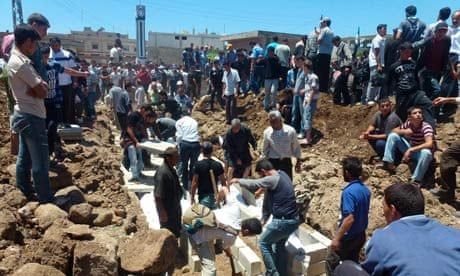A senior commander in Iran's Revolutionary Guards has admitted that Iranian forces are operating in Syria in support of Bashar al-Assad's regime.
Ismail Gha'ani, the deputy head of Iran's Quds force, the arm of the Revolutionary Guards tasked with overseas operations, said in an interview with the semi-official Isna news agency: "If the Islamic republic was not present in Syria, the massacre of people would have happened on a much larger scale."
Isna published the interview at the weekend but subsequently removed it from its website.
It quoted Gha'ani as saying: "Before our presence in Syria, too many people were killed by the opposition but with the physical and non-physical presence of the Islamic republic, big massacres in Syria were prevented."
The west has accused Iran of providing military and technical support to Assad to quell protests since the start of the uprising in Syria. Iranian officials in return played down the accusations by saying the country only supported Syria morally.
As the wave of protests swept across the Middle East, Tehran's leaders found themselves in the peculiar situation of praising the uprisings in Tunisia, Egypt, Bahrain and Yemen but condemning them in Syria, its close ally in the region.
The Iranian opposition has tried to claim credit for the Arab spring saying it was inspired by the events in the aftermath of Iran's disputed presidential elections in 2009, but the country's supreme leader, Ayatollah Ali Khamenei, said the vents of the last 18 months was reminiscent of the 1979 Islamic revolution. Khamenei has since referred to the Arab spring as the "Islamic awakening".
"This is the first time that an IRGC senior officer has admitted that the Quds force is operating in Syria," said Meir Javedanfar, an Iranian-Israeli Middle East expert.
"This could be due to the Iranian government feeling threatened by the increasing isolation of Syria and the dangers which such isolation and possible fall of Assad could pose to its interests in Syria, and to its Hezbollah allies in Lebanon.
"By making such an admission now, Iran may very well be wishing to send the message that when it comes to Syria the gloves are off and whoever wants to confront Assad will be confronting Iran's most experienced and potent special forces operatives."
On Monday, Iran also blamed "foreign interference" and "terrorists" for the killing of more than 100 people, many of them children, in the Syrian town of Houla.
"We are certain that foreign interference, terrorists and suspicious measures which have targeted the resilient Syrian people are doomed to fail," said the Iranian foreign ministry spokesman, Ramin Mehmanparast, in quotes carried by the website of Iran's state English-language television channel, Press TV.
"The attack has been carried out in order to create chaos and instability in Syria and its perpetrators are trying to block the way to a peaceful resolution," he said.
Iran's Quds force has been in the spotlight in recent years mainly for its activities inside Iraq.
Part of the responsibility of the Quds force is to protect the concept of Islamic revolution which the revolutionary guards view as being closely tied up with protecting Khamenei.
